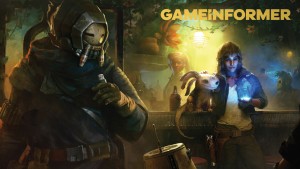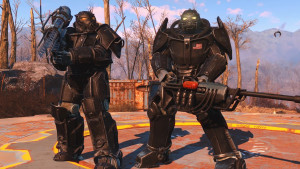Please support Game Informer. Print magazine subscriptions are less than $2 per issue
One Night Stand: Lost Odyssey

We all tend to fall back on our staple gaming genres, sometimes at the expense of trying new things. In One Night Stand, I'm going to try a game I wouldn't normally play for one evening. This time it's Mistwalker's JRPG Lost Odyssey.
This will seem like heresy to many of our readers, but I've never enjoyed JRPGs. This dates back to being bored with Dragon Warrior on NES (the retitled American release of Enix's Dragon Quest) when I was having a sleepover at a friend's house. I remembering bringing home Final Fantasy VII for PlayStation because of all the hype, and burning out after a few hours. Whether it's the often-stilted writing, turn-based combat, or languid pace, the genre has never resonated with me.
However, in hopes of becoming a more open-minded, well-rounded gamer, I'm going to be doing a series of "One Night Stand" articles this year, in which I take home a game from a genre or series that I'm normally not drawn to, and make an honest effort to play it with an open mind.
I decided to start with a JPRG. I asked my colleague Andrew Reiner, who has played more games than anyone I know, which JRPG might be fitting for this exercise. He recommended Mistwalker's Lost Odyssey, designed by famed Final Fantasy creator Hironobu Sakaguchi and released for Xbox 360 in 2008.
After booting the game up, I'm pleased that - unlike so many of its ilk - Lost Odyssey gets off to a peppy start, throwing me into the middle of an epic battle reminiscent of a Lord of the Rings film. The only difference is the knights on one side of the battle have odd helmets that make them appear to be large bottle openers. I take this as a sign, pause, and grab a beer from the fridge. It's an impressive scene, but also makes me realize just how long the Xbox 360/PlayStation 3 console generation lasted. Lost Odyssey still looks good, but it's from 2008 and does appear visibly dated. In particular, the facial and character animations look extremely artificial - even in cutscenes. The last game I played on my Xbox 360 was Tomb Raider (to compare against the new Definitive Edition), and it's amazing how much better graphics have become over the course of a few years.
Soon, a handsome, long-haired gentleman in odd armor (which, I guess, describes 75 percent of all RPG heroes ever) starts single-handedly conquering the battlefield like a medieval Neo from The Matrix. After the cutscenes stop, I'm introduced to the turn-based battle system. It's a short but informative tutorial. One of the things I really like about Lost Odyssey is that it does a good job of explaining new gameplay and battle system concepts. Each new layer to the systems that is introduced has a nice, concise tutorial. Even as a relative novice, I always felt as though I knew what was going on.
I made some dumb mistakes in my initial battle, especially when I was matched against a giant tank, but I still escaped the battle with 2 HP left. Ultimately, my heroics didn't matter much because a giant lava-filled meteor crashed landed on the battlefield, engulfing my enemies and allies alike.
I somehow survived this catastrophe, and now spend some time wandering about, engaging in random encounters with enemies that resemble the zombie-like minions I just battled.
I'm going to pause here and inject my opinion: I don't like random encounters. I realize they are a staple of the JRPG, but I think they are lazy design in a modern game. I understand the need for players to grind for XP and items, but I feel that it could be done in a much more meaningful way than just taking two steps in the wrong direction then arbitrarily being teleported into a battle screen. As a player, it makes me feel as though I have no agency - why can't I at least see the enemies so I can try to avoid them? Or, better yet, flank them in some way to gain the element of surprise? In any case, it gets really annoying, especially later when I sometimes had characters who were low on HP and I was trying to make the next save point.
Speaking of which: remember save points? You get so accustomed to the modern automatic checkpointing of games or save anywhere functionality, it's a bit tedious to go back to save points. The (perhaps sad) fact is that I've been spoiled now to the point where I hate losing progress of any kind when I die.
Eventually I meet up with some fellow soldiers, who seem surprised I survived. They take me to their camp, put me on a strangle vehicle that resembles a long box with four large wheels, and it's time to head to the big city.

From here, the plot thickens. As you'd expect, it's both convoluted and predictable. In summary: Kaim (our hero) is immortal and has lived for 1,000 years. However, he cannot remember his past. There's another immortal, a sassy (and oddly underdressed) girl named Seth.
The kingdom we occupy has been transformed by the "Magic-Industrial Revolution," in which much of the land and its machinery are powered by magic forces that scientists have been able to harness. Some competing political forces are at at work, some who support the use of more magic, others who fear it - as well as the family of a deposed king and some royalists that remain secretly loyal. In classic RPG style, I learn all of this through cutscenes and time spent wandering a city populated by NPCs who always seem to be speaking facts relevant to the plot. Generally, the game seems to use the heavy-handed industry vs. nature allegory that's been staple of fantasy since Tolkien.
The army I faced initially was a savage race called the Khent, who have been at war with the kingdom - though many fear another, more formidable kingdom, the Gohtza, are pulling the strings. The meteor that struck the battlefield was the result of some magical energy gone awry. The kingdom's leadership council thinks it has something to do with the Grand Staff, a giant magic-harvesting apparatus that's being built, and tells Kaim to go investigate.
Of course, I'm joined by Seth (who I'm sure was a love interest 800 years ago or something) and another party member...Jansen. This guy. He's a real f------ piece of work, let me tell you. Seriously, I don't know who thought this character was a good idea but let me attempt to explain. So, he looks vaguely like a ponytailed surfer dressed as a glam-metal geisha. He acts like some strange anime frat guy who's constantly making terrible jokes then wondering why people are mad at him. He is one of the most aggravating characters I've encountered in some time. I asked Reiner about him, and he said he came to like him over time. I asked the same question of Joe Juba, and he rolled his eyes, shook his head, and said, "That guy sucks." He also informed me that Jansen made our Dorks of the Year list that year; I'd say it's well deserved.

While the plot is interesting enough to keep my attention, it also makes me recall another thing that's always bothered me about JRPGs: generally poor writing. Now, I admit there are a ton of great JPRGs I haven't played, but even some of my colleagues at work seem to acknowledge that stilted, often cheesy dialogue is just part of genre for the most part. Frankly, there are times that - when compared to recent games like BioShock Infinite or The Last of Us - Lost Odyssey feels like it was written by a teenage boy. I've seen too many excellently written Japanese films to mark that down to translation issues.
There's also a way the game has of "teasing" plot reveals that seem pretty predictable that grates. They keep playing coy about Kaim when it's clear that he's lived for many lifetimes and experiences memories of his past in the form of dreams. I'm also pretty sure that, given that we're both immortal, Kaim and Seth have crossed paths before. And - call me crazy - but this Gongora guy who is behind the Grand Staff (and claims to have made the spell which makes Kaim immortal) might not be on the level. Just a guess.
That said, for some reason I'm still a bit hooked in finding out where this all goes. So, maybe it works. I still don't understand why the moment-to-moment dialogue has to be so hamfisted, but I guess fans of the genre are used to it by now.
Despite my problems with the storytelling, it's clear that this is a very solidly made RPG. The combat, magic, and skill systems are all easy to grasp while offering a lot of depth if you want to dig into them. There's also an action element added by rings which can be made by scavenged items and materials. You can equip rings to give your character special boosts in battle, but you must pull off them off with brief quick-time events. As Kaim runs to an enemy a large circle shrinks towards a smaller one. If you release the right trigger right as they intersect, you'll get a "Perfect" rating, and take more hits points off the enemy. I really like this element, because it adds some tension to the battles and a little physical skill.
Unfortunately, my great timing didn't prevent me and my party from getting destroyed by a massive griffin, which put my play session to an end. It was my fault; I took too long to notice that Jansen was only taking off 2 hit points with each attack, and I should have instantly switched to using him for healing, bomb, and item use. Joe told me I might have to go grind some random encounters, another part of this genre that's never appealed to me.
I'm glad I took the time to play Lost Odyssey, and think I will keep playing, but I'm not sure it's converted me to the JPRG. Too many conventions of the genre just take away from my enjoyment. I'm not sure there's much that could be changed either. Frankly, most of my suggestions would make it more like western RPGs like Skyrim. I suspect that any major changes would result in alienating the core JPRG audience without having the polish or production values to appeal to someone like me.
In many ways, I think the JRPG is destined to end up in a position similar to that of jazz in the world of music: continuing to make small refinements and hybridizations of its tradition to an increasingly small audience. As a jazz fan, I can say there's nothing wrong with that, but the days when Final Fantasy games were huge cultural events in video games are long past and likely not returning.










